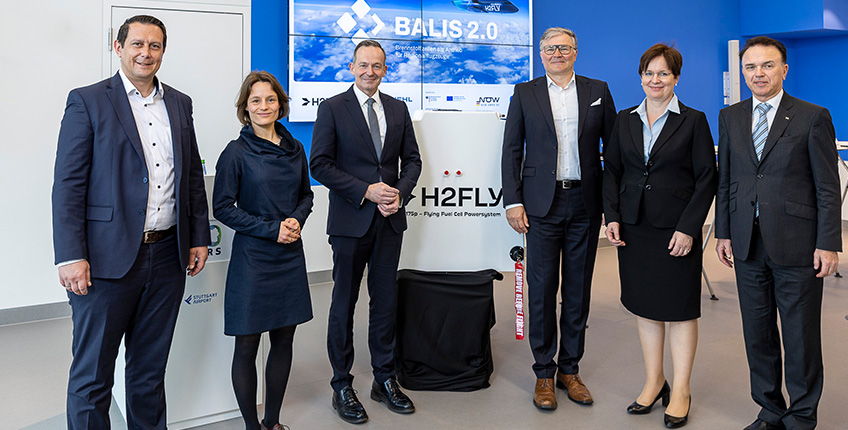The Federal Ministry for Digital and Transport is funding a project for the further development of hydrogen fuel cell technology for regional aircraft.
The Federal Ministry for Digital and Transport (BMDV) today officially launched research and development project BALIS 2.0. Federal Minister for Digital and Transport Dr. Volker Wissing presented the project’s consortium with the funding certificate for the further development of fuel cell drives for regional aircraft on the occasion of the project’s kick-off event at Stuttgart airport.
Under the leadership of Stuttgart-based company H2FLY and in cooperation with the German Aerospace Center (DLR) and Diehl Aerospace, the BALIS 2.0 project is developing and testing a high-performance fuel cell module with a capacity of 350 kW that is suitable for use in aviation. This basic module constitutes the basis for the development of megawatt drive systems. This could enable commercial regional airplanes with 40-80 seats to be powered with zero emissions in the future.
From 2024 to 2026, BALIS 2.0 will be funded in the amount of 9.3 million euros from the BMDV. Funding for this measure will also be provided in the framework of the German Recovery and Resilience Plan (DARP) via the European Recovery and Resilience Facilities (ARF) in the NextGenerationEU programme. The funding guideline is coordinated by NOW GmbH and implemented by Project Management Jülich (PtJ). From the initial project outline to project completion, PtJ will support all project partners, thereby ensuring the successful realisation of the programme goals.
Partnership of Science and Industry
H2FLY is assuming project leadership and is responsible for the development of the 350 kW fuel cell system that will be tested in a megawatt system as a basic module. In the BALIS test environment, the German Aerospace Center (DLR) is examining the coupling behaviour of fuel cell systems in the megawatt power range with an electric drive and is conducting investigations into optimising the overall system operation. Diehl Aerospace is continuing to develop its very high-performance and highly reliable platform technology in order to facilitate the efficient coupling and scaling of fuel cell systems.
Federal Ministry for Digital and Transport, Dr. Volker Wissing said: “I’m very proud that Germany is taking on a pioneering role in the development of hydrogen fuel cell systems for commercial aviation. This allows us to create the technical foundations for marketable solutions for the CO2-neutral aviation of tomorrow. Companies and research institutes such as the BALIS 2.0 project consortium are bravely advancing with excellent expertise and a pioneering spirit. Defossilising aviation is a huge global challenge. Hydrogen offers great potential to become an important contributor to future zero-emission travel and freight transport globally and to achieving climate targets.”
Korinna Jörling, Head of Hydrogen, Alternative Fuels and Fuel Cells at NOW GmbH said: “BALIS 2.0 is a milestone for a sustainable future for aviation. The development and implementation of hydrogen technology in aviation marks not only a momentous step, but also an urgently needed response to the challenges of climate change. Investment and innovation in this field highlights the decisive role public funding plays in terms of pioneering technologies and their transformative impact on the aviation sector.”
Dr. Stephanie Bauer, Head of Project Management Jülich commented: “The transformation of the transport sector is underway, with the federal government supporting this process through various research and innovation programmes. For example at PtJ, we are launching new drive technologies in aviation for the mobility of tomorrow through the BMDV’s ‘National Innovation Programme for Hydrogen and Fuel Cell Technology’. The BALIS 2.0 project excels not just in terms of technology, but in terms of its consortium with the strong start-up H2FLY as project coordinator.”
Prof. Dr. Josef Kallo, co-founder and CEO of H2FLY: “Federal funding for the BALIS 2.0 project underlines the increasing significance of hydrogen fuel cell technology as a drive system solution for aviation. The findings from this project will further support the development of emission-free drive solutions in the megawatt class and majorly contribute towards sustainable aviation.”
Prof. Dr. André Thess, Head of the DLR Institute for Technical Thermodynamics: “Emission-free mobility is DLR’s vision. BALIS 2.0 represents another significant milestone in using new technologies on the path to climate-friendly mobility. With our own research structure at DLR, we are able to test drivetrains in the megawatt range in an application-focussed way, bringing us a step closer to the DLR vision.”
Florian Maier, President & CEO Diehl Aerospace GmbH: “Our contribution to the BALIS 2.0 project underlines the important role of the equipment industry in developing innovative and eco-efficient aircraft systems and drive technologies. We are proud to be able to support such an important research project for more sustainable aviation with our experience and technology.”
The first ground tests of the fuel cell system are scheduled for this year in the BALIS test field of the DLR in Empfingen, built for the predecessor project, BALIS 1.
About NOW GmbH
Since 2008, NOW GmbH has been supporting the federal government’s targets in its climate and industrial policy. The tasks of the federally-owned company include developing, monitoring and evaluating funding programmes about climate-neutral mobility and energy supply. NOW GmbH experts supervise projects in the areas of hydrogen, fuel cells, battery and renewable fuels. They reimagine mobility and fuels for cars, buses, trains, commercial vehicles, ships and airplanes, and support the establishment and further development of charging infrastructure and hydrogen refuelling stations for cars and trucks. More information on NOW can be found here.
Photo: H2Fly


